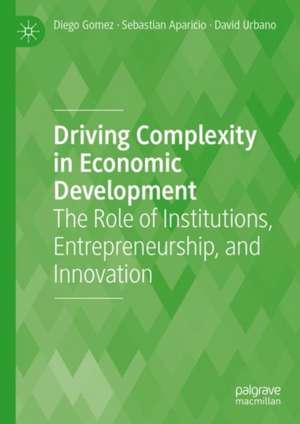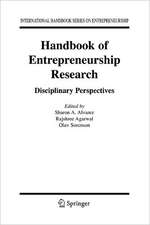Driving Complexity in Economic Development: The Role of Institutions, Entrepreneurship, and Innovation
Editat de Diego Gomez, Sebastian Aparicio, David Urbanoen Limba Engleză Hardback – 24 aug 2023
Set against the backdrop of populism, this book is based on the premise that formal and informal institutional factors and entrepreneurship are closely linked and that studying the economic development of both developed and emerging economies can help us disentangle the role of entrepreneurship and innovation in developing countries.
Using institutional economics as a main theoretical framework and the sociotechnical subsystems as a complementary approach, the authors present a detailed literature review to demonstrate that it is possible to identify the true role of entrepreneurship and innovation in the economic development process. The book embraces complexity to better measure and comprehend economic development, bringing a more compelling perspective on the importance of entrepreneurship and innovation for different dimensions ofdevelopment.
A valuable resource for students, scholars, and policymakers, the authors offer clear recommendations for developing countries.
Preț: 899.87 lei
Preț vechi: 1097.41 lei
-18% Nou
Puncte Express: 1350
Preț estimativ în valută:
172.24€ • 187.16$ • 144.78£
172.24€ • 187.16$ • 144.78£
Carte disponibilă
Livrare economică 31 martie-14 aprilie
Preluare comenzi: 021 569.72.76
Specificații
ISBN-13: 9783031343858
ISBN-10: 3031343859
Ilustrații: XX, 440 p. 44 illus.
Dimensiuni: 148 x 210 mm
Greutate: 0.7 kg
Ediția:1st ed. 2023
Editura: Springer International Publishing
Colecția Palgrave Macmillan
Locul publicării:Cham, Switzerland
ISBN-10: 3031343859
Ilustrații: XX, 440 p. 44 illus.
Dimensiuni: 148 x 210 mm
Greutate: 0.7 kg
Ediția:1st ed. 2023
Editura: Springer International Publishing
Colecția Palgrave Macmillan
Locul publicării:Cham, Switzerland
Cuprins
Chapter 1: General Introduction.- Chapter 2: Entrepreneurial Activity and Economic Growth: A Literature Review.-
Chapter 3: A Review of Economic Development Thinking and the Role of Innovative Entrepreneurship: Past, Present, and Future.- Chapter 4: Why Do Some Nations Succeed While Others Fail? The Role of Culture and Regulations in Entrepreneurship and Innovation.- Chapter 5: Diagnosing the Dynamics of Economic Growth.- Chapter 6: Taxes and Economic Growth: The Role of the Central Government.- Chapter 7: The Effects of the Internal Rate of Return on Economic Development: A Country-Level Study.- Chapter 8: Entrepreneurship Crossing Borders: The Multilevel Relationship Between Institutional Obstacles and Firm’s Export.- Chapter 9: From Micro to Macro: Entrepreneurial Choice and Economic Growth Across Cities in a Developing Country.- Chapter 10: Does Company Size Matter for Economic Growth? An Analysis Across OECD, Latin American, and Caribbean Countries.- Chapter 11: Understating (Under)Development Through Inequality and Poverty: A Principal Component Analysis.- Chapter 12: A Sociotechnical Approach to Economic Development: The Role of Entrepreneurship and Innovation.- Chapter 13: General Conclusions.
Chapter 3: A Review of Economic Development Thinking and the Role of Innovative Entrepreneurship: Past, Present, and Future.- Chapter 4: Why Do Some Nations Succeed While Others Fail? The Role of Culture and Regulations in Entrepreneurship and Innovation.- Chapter 5: Diagnosing the Dynamics of Economic Growth.- Chapter 6: Taxes and Economic Growth: The Role of the Central Government.- Chapter 7: The Effects of the Internal Rate of Return on Economic Development: A Country-Level Study.- Chapter 8: Entrepreneurship Crossing Borders: The Multilevel Relationship Between Institutional Obstacles and Firm’s Export.- Chapter 9: From Micro to Macro: Entrepreneurial Choice and Economic Growth Across Cities in a Developing Country.- Chapter 10: Does Company Size Matter for Economic Growth? An Analysis Across OECD, Latin American, and Caribbean Countries.- Chapter 11: Understating (Under)Development Through Inequality and Poverty: A Principal Component Analysis.- Chapter 12: A Sociotechnical Approach to Economic Development: The Role of Entrepreneurship and Innovation.- Chapter 13: General Conclusions.
Notă biografică
Diego Gomez is the Executive Director of Fundación ECSIM (Economic Center for Simulation and Modelling) in Medellin, Colombia. Diego’s research explores the complexity involved in the economic development process, taking into consideration the existence of interrelated systems and the role of innovation and entrepreneurship in boosting such relationships.
Sebastian Aparicio is a Serra Hunter Fellow in the Department of Business at Universitat Autònoma de Barcelona (UAB). He is also a Researcher at the Centre for Entrepreneurship and Social Innovation Research (CREIS) and at the Centre for University Entrepreneurship (CIEU-UAB). His research explores the effects of entrepreneurship on economic development.
David Urbano is a Professor of Entrepreneurship at the Department of Business and ICREA-Academia research fellow. Also, he is Director at the Centre for Entrepreneurship and Social Innovation Research (CREIS) (Universitat Autònoma de Barcelona). His research focuses on the analysis of factors affecting entrepreneurship in different contexts, using the institutional approach.
Sebastian Aparicio is a Serra Hunter Fellow in the Department of Business at Universitat Autònoma de Barcelona (UAB). He is also a Researcher at the Centre for Entrepreneurship and Social Innovation Research (CREIS) and at the Centre for University Entrepreneurship (CIEU-UAB). His research explores the effects of entrepreneurship on economic development.
David Urbano is a Professor of Entrepreneurship at the Department of Business and ICREA-Academia research fellow. Also, he is Director at the Centre for Entrepreneurship and Social Innovation Research (CREIS) (Universitat Autònoma de Barcelona). His research focuses on the analysis of factors affecting entrepreneurship in different contexts, using the institutional approach.
Textul de pe ultima copertă
This book analyzes the role of institutions in conditioning entrepreneurship and innovation to achieve economic development.
Set against the backdrop of populism, this book is based on the premise that formal and informal institutional factors and entrepreneurship are closely linked and that studying the economic development of both developed and emerging economies can help us disentangle the role of entrepreneurship and innovation in developing countries.
Using institutional economics as a main theoretical framework and the sociotechnical subsystems as a complementary approach, the authors present a detailed literature review to demonstrate that it is possible to identify the true role of entrepreneurship and innovation in the economic development process. The book embraces complexity to better measure and comprehend economic development, bringing a more compelling perspective on the importance of entrepreneurship and innovation for different dimensions of development. A valuable resource for students, scholars, and policymakers, the authors offer clear recommendations for developing countries.
Diego Gomez is the Executive Director of Fundación ECSIM (Economic Center for Simulation and Modelling) in Medellin, Colombia. Diego’s research explores the complexity involved in the economic development process, taking into consideration the existence of interrelated systems and the role of innovation and entrepreneurship in boosting such relationships.
Sebastian Aparicio is a Serra Hunter Fellow in the Department of Business at Universitat Autònoma de Barcelona (UAB). He is also a Researcher at the Centre for Entrepreneurship and Social Innovation Research (CREIS) and at the Centre for University Entrepreneurship (CIEU-UAB). His research explores the effects of entrepreneurship on economic development.
David Urbano is a Professor of Entrepreneurship at the Department of Business and ICREA-Academia research fellow. Also, he is Director at the Centre for Entrepreneurship and Social Innovation Research (CREIS) (Universitat Autònoma de Barcelona). His research focuses on the analysis of factors affecting entrepreneurship in different contexts, using the institutional approach.
Set against the backdrop of populism, this book is based on the premise that formal and informal institutional factors and entrepreneurship are closely linked and that studying the economic development of both developed and emerging economies can help us disentangle the role of entrepreneurship and innovation in developing countries.
Using institutional economics as a main theoretical framework and the sociotechnical subsystems as a complementary approach, the authors present a detailed literature review to demonstrate that it is possible to identify the true role of entrepreneurship and innovation in the economic development process. The book embraces complexity to better measure and comprehend economic development, bringing a more compelling perspective on the importance of entrepreneurship and innovation for different dimensions of development. A valuable resource for students, scholars, and policymakers, the authors offer clear recommendations for developing countries.
Diego Gomez is the Executive Director of Fundación ECSIM (Economic Center for Simulation and Modelling) in Medellin, Colombia. Diego’s research explores the complexity involved in the economic development process, taking into consideration the existence of interrelated systems and the role of innovation and entrepreneurship in boosting such relationships.
Sebastian Aparicio is a Serra Hunter Fellow in the Department of Business at Universitat Autònoma de Barcelona (UAB). He is also a Researcher at the Centre for Entrepreneurship and Social Innovation Research (CREIS) and at the Centre for University Entrepreneurship (CIEU-UAB). His research explores the effects of entrepreneurship on economic development.
David Urbano is a Professor of Entrepreneurship at the Department of Business and ICREA-Academia research fellow. Also, he is Director at the Centre for Entrepreneurship and Social Innovation Research (CREIS) (Universitat Autònoma de Barcelona). His research focuses on the analysis of factors affecting entrepreneurship in different contexts, using the institutional approach.
Caracteristici
Offers specific guidelines toward the improvement of developing economies, notably in the context of Latin America Provides compelling evidence about the effects of entrepreneurship and innovation on outcomes Offers a series of case studies across developed and developing countries



























